“The Maquis, Part II”
Written by Rick Berman & Michael Piller & Jeri Taylor and Ira Steven Behr
Directed by Corey Allen
Season 2, Episode 21
Production episode 40512-441
Original air date: May 1, 1994
Stardate: unknown
Station log: After a summary of Part 1, Hudson hands Sisko his uniform, saying it’s been feeling a little tight lately. He thinks that defending the colonies is a nobler cause than being in Starfleet. Hudson insists that Central Command is smuggling weapons into the Demlitarized Zone, which are being used against the colonies—but he doesn’t have proof. Sisko wants to obtain the proof and show it to the Federation, but Hudson isn’t interested in diplomatic solutions anymore. He’s answering violence with violence. When it’s clear that Sisko won’t help him (Hudson asks him to let the Maquis use DS9 as a maintenance port), Hudson stuns him, as well as Kira and Bashir, and leaves them behind.
When they wake up, they fly back to the station. Sisko’s request to speak to Central Command and Starfleet Command is fulfilled by Dax faster than expected, as a legate from the former is en route, and Admiral Nechayev from the latter is waiting in his office. Dukat wasn’t on the planet where they found Hudson, so Sisko tasks O’Brien with trying to figure out where he was transferred off before meeting with the admiral.
Nechayev informs Sisko that Cardassia is on high alert after Dukat’s kidnapping. She also expresses concern with Odo’s position as security chief, and wouldn’t a Starfleet officer be better? She orders Sisko to establish a dialogue with the Maquis, try to get them to listen to reason. Sisko neglects to inform her that he’s already tried that, and he doesn’t inform her of Hudson’s defection, either. As soon as she leaves and Kira enters, Sisko rants and raves for a bit about how it’s easy to be a saint in paradise, but while Starfleet Headquarters is in the middle of a poverty-and crime-free Earth, out in the DMZ all the problems haven’t been solved yet. Kira very approvingly says she gets what he’s saying.
Odo summons Sisko to his office, where he’s captured one of Sakonna’s accomplices: Quark. The Ferengi insists that the time he spent with Sakonna was purely social, but that insistence doesn’t last long, and he gives her up, adding that her timetable was tight, so whatever she needed the weapons for, it was going to happen soon.
After Quark promises to provide a list of everything Sakonna bought, Odo asks Sisko two questions: if he can go along with Sisko when he searches for Dukat next (he says yes) and how long he should keep Quark in prison (“Forever”).
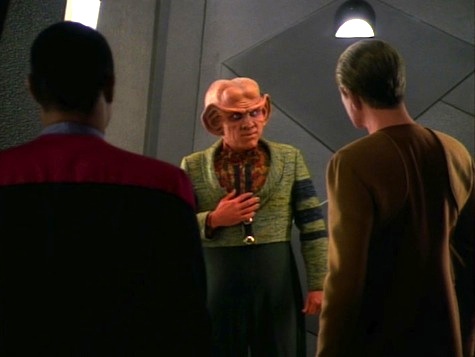
Sisko meets with Legate Parn next. Parn says that Dukat was the leader of a group of misguided military officers who were funneling weapons into the DMZ. The other conspirators have been arrested, and as far as Parn is concerned, Dukat can stay a prisoner of the Maquis. Neither Kira (who spends the entire conversation being completely ignored by Parn) nor Sisko believe a word he says, but it does confirm that Central Command has been shipping weapons into the DMZ, they’ve just scapegoated some folks for it (including Dukat).
Now that Central Command has left him for dead, Sisko’s even more motivated to find Dukat (to Kira’s dismay). O’Brien traces five possible planets he could’ve been taken to, and Sisko takes Odo and Bashir on the Rio Grande to check them out.
On one of those planets, Sakonna tries a Vulcan mind-meld on Dukat, which fails thanks to his training. They didn’t have a backup plan for interrogating him since, for all their protestations that they share little in common with the Federation, they’re still Federation citizens at heart and so won’t resort to nastier means of extracting information—something Dukat reminds them with great glee.
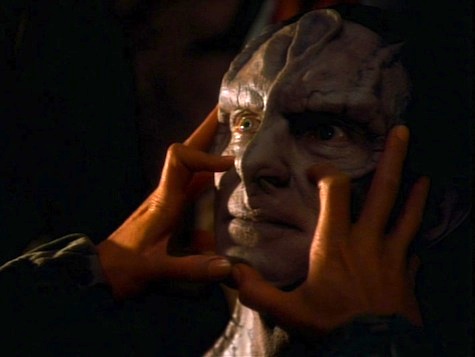
However, Sisko, Odo, and Bashir get the drop on them. Dukat insists they shoot, but Sisko wants to talk. Dukat takes matters into his own hands by slugging Sakonna (the second time he’s done that) with handcuffed hands, and then Amaros fires on Sisko. Starfleet wins the ensuing firefight, and Sisko orders them all taken prisoner—except for Amaros, whom he sends to Hudson with a message: he hasn’t told Starfleet about his defection, he still has Hudson’s uniform, and there’s still time to end this without further violence.
Back on the station, Dukat enjoys a post-trauma feast. He and Sisko compare their respective governments’ forms of jurisprudence—on Cardassia, the verdict is known before the trial begins, and it’s always “guilty.” When Sisko asks if they ever condemn an innocent person by mistake, Dukat insists that Cardassians don’t make mistakes. Dukat then proves that statement wrong by asking why it was Sisko who rescued him rather than Central Command, at which point Sisko takes great glee in informing Dukat that he’s been found guilty of espionage. Dukat realizes that Central Command has cut him loose, having never told him in the first place that they were sending weapons into the DMZ.
When Dukat thanks Sisko for rescuing him, the commander barely manages to keep a straight face when he says that Dukat would’ve done the same for him.
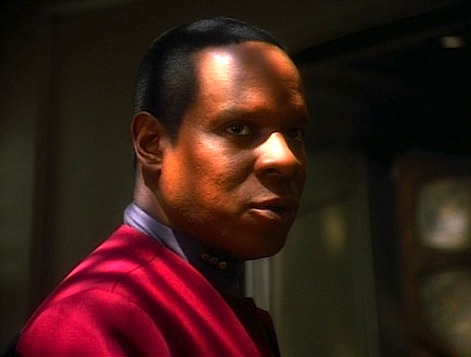
Dukat sits in on a staff meeting, at Sisko’s invitation. Odo has the list of weapons Sakonna bought from Quark, and it’s extensive. They’re preparing for all-out war. Dukat theorizes that the Xepolites are being used by Central Command to ship the weapons into the DMZ.
Sisko, Kira, O’Brien, and Dukat take a runabout to intercept a Xepolite freighter. It has a sensor-proof hull, they’ve raised shields, and they refuse to allow Sisko to beam over to inspect their cargo. Dukat then stands up and throws his weight around, intimidating the Xepolite captain into capitulating.
Back on the station, Sakonna and Quark are sharing a cell, and the latter tries to point out to the former that the price of peace is at an all-time low. Now that everybody’s armed to the teeth, but nobody has an advantage (since Central Command now has to disavow the shipments into the DMZ), that’s the best time to acquire peace, because once you start using the weapons, the price will skyrocket to the point where it’s unattainable.
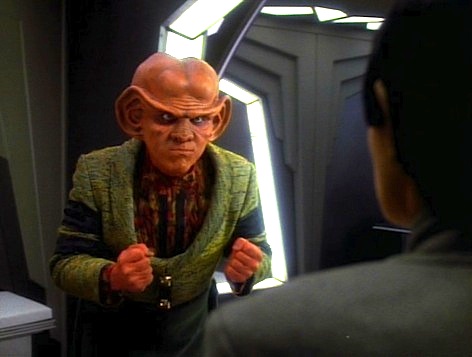
Quark convinces her and she confesses to Sisko that the Maquis is targeting a hidden weapons depot on a Cardassian colony, but she doesn’t know which one. Dukat says he can find out the location (he’s on the outs with Central Command, but he still has friends), and while he’s doing that, Sisko goes to meet with the council that Amaros and Kobb serve on, making one last plea to stop the violence, and also warning them that he knows about the attack on the depot. Besides, with the Central Command’s supply lines cut off, there’s no need for the Maquis to even exist anymore.
Hudson enters, and Sisko presents him with his uniform. Hudson phasers it into atoms and makes it clear that he’s fighting a war and diplomacy is no longer any kind of option.
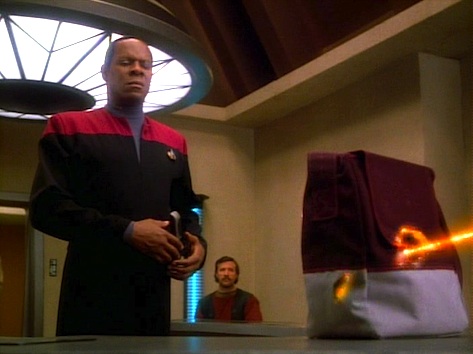
Dukat has learned that the targeted depot is on the Bryma colony. Sisko takes all three runabouts to the system. The Maquis only have two ships capable of mounting the weapons Sakonna purchased, so they’ll have numbers at least. O’Brien deploys sensor drones in the system’s Oort cloud to detect their arrival. Sure enough, two ships show up. Sisko pleads with Hudson to turn back; Hudson pleads with Sisko not to put him in a position where he has to fire on his old friend.
The ensuing firefight is comparatively tame, as neither side really wants to hurt the other. In the end, one Maquis ship is drifting, and the Orinoco is badly enough damaged that the Mekong has to rescue them. That just leaves Sisko versus Hudson. The Rio Grande’s engines are down so they can’t move—Hudson’s weapons are down, so he can’t fire back. Hudson is at Sisko’s mercy, but Sisko tries pleading with him again, to Dukat’s annoyance. It doesn’t work, and Hudson gets away. Dukat expresses his disappointment in Sisko’s letting sentiment get in the way of what needs to be done. Sisko tartly informs Dukat that he won’t be losing any sleep over that.
Sisko gets a commendation for preserving the peace. But he’s fairly certain he’s only delayed the inevitable.
The Sisko is of Bajor: On the one hand, Sisko does good work here, doing everything he can to keep the peace, even going so far as to rescue Dukat in order to use him. But the one step he won’t take (at least until the very end) is to betray his friend. He deliberately lies to a superior officer (a court-martial offense) about Hudson’s status and gives him every opportunity to stand down and not let the situation get out of control. For his part, Hudson does nothing to earn this consideration, as he shoots Sisko in the teaser and then fires on his ship in the climax.
Don’t ask my opinion next time: Kira gets to play fly-in-the-ointment during every scene with Parn and Dukat, snarking the Cardassians off (often with justification) at every opportunity. But she’s also obviously (and reluctantly) impressed with Dukat’s takedown of the Xepolite.
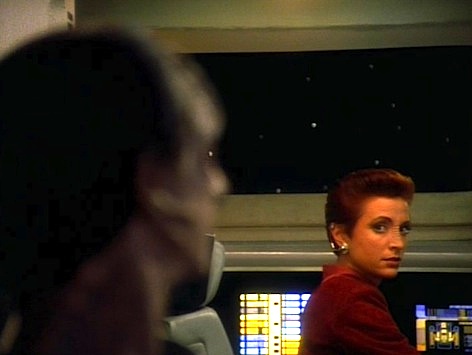
Rules of Acquisition: When Quark is lecturing Sakonna in the cell, he quotes the Third Rule: “Never spend more for an acquisition than you have to.”
For Cardassia! Once it becomes obvious that the jig is up with regards to their arming their colonies in violation of the treaty, Central Command wastes no time in disavowing any knowledge and scapegoating some “rogue operatives” (probably people who were politically out of favor already) as well as Dukat, who had already been captured and who therefore made an easy target. Pity it didn’t occur to them that Sisko would go ahead with a rescue attempt anyhow.
Preservation of mass and energy is for wimps: Odo transforms his arm into a lasso to grab Amaros and throw him to the ground. Honestly, that’s an application of Odo’s shapeshifting that should’ve been used more often….
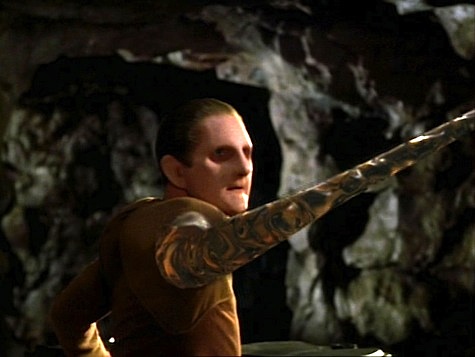
Keep your ears open: “Do you expect us to believe that a Vulcan would be interested in you for your lobes?”
“Vulcans are a species that appreciate good ears.”
Odo expressing doubt that Sakonna would be interested in Quark for any reason other than business and Quark with a fairly obvious rejoinder.
Welcome aboard: Back from Part 1 are Tony Plana as Amaros, Bertila Damas as Sakonna, Michael Rose as Niles, Amanda Carlin as Kobb, and, of course, Marc Alaimo as Dukat and Bernie Casey as Hudson. Prolific voice actor Michael Bell shows up as the Xepolite; he last appeared in “The Homecoming” as a Bajoran prisoner, and was also Groppler Zorn in TNG’s “Encounter at Farpoint.”
Natalija Nogulich makes her first DS9 appearance as Admiral Nechayev—she had appeared thrice as Nechayev on TNG, in “Chain of Command, Part I,” “Descent,” and “Journey’s End.” She’ll be back on DS9 in “The Search, Part II,” and also appear in TNG’s “Preemptive Strike.”
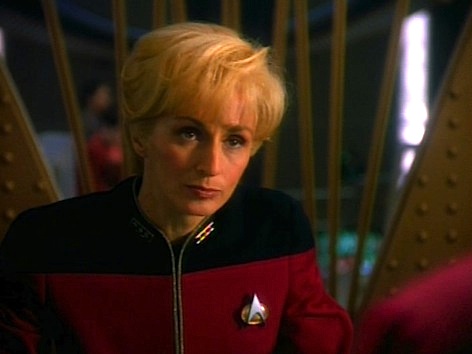
Finally, John Shuck, one of the great actors of our time, appears as Legate Parn. It’s one of four roles Shuck has played on Trek, the others being the Klingon ambassador in Star Trek IV: The Voyage Home and Star Trek VI: The Undiscovered Country; a member of the chorus in Voyager’s “Muse”; and the Klingon geneticist Antaak in the two-part Enterprise story “Affliction” and “Divergence.”
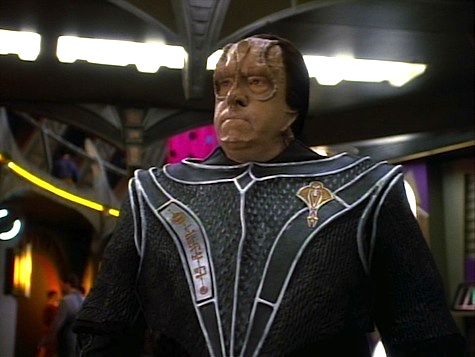
Trivial matters: Scripter Ira Steven Behr’s original intent was for Hudson to die at the end of the episode, but he was overridden by executive producer Michael Piller. After seeing the dailies, Piller reportedly realized that Behr was right. However, we won’t see Hudson again onscreen, and he’ll die off-camera at some point prior to “Blaze of Glory.”
The Maquis will next be seen in “Tribunal” and in TNG’s “Preemptive Strike.”
To keep things consistent, the characters of Nechayev and Evek were regular presences in the Maquis storylines of the 1993/1994 season, with Natalija Nogulich and Richard Poe appearing in both TNG Maquis episodes and each appearing in one part of this storyline. Evek will also be the one chasing Chakotay’s ship into the Badlands in Voyager’s pilot, “Caretaker.”
Hudson enters the council chambers flanked by a Native man and a Klingon woman, possibly a foreshadowing of the characters of Chakotay and B’Elanna Torres on Voyager.
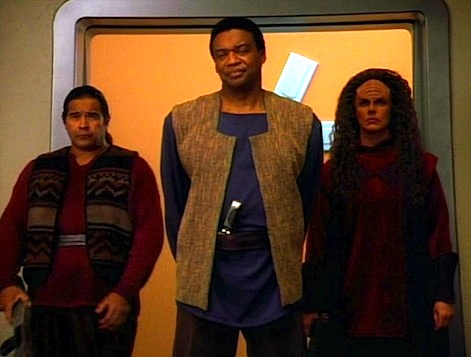
Dukat mentions that Cardassians only have show trials, and that the verdict is determined before the trial ever starts. We’ll see this in practice in “Tribunal” later this season.
This DS9’s first time showing a Vulcan mind-meld, first seen in “Dagger of the Mind” in the original series, and seen numerous times since. This is also the first time we’ve seen it not actually work.
This is the last episode of Trek to be directed by Corey Allen, who helmed the TNG pilot episode “Encounter at Farpoint.”
Walk with the Prophets: “It’s easy to be a saint in paradise.” On the one hand, this is a step up from Part 1 in that our heroes actually do stuff. The episode is also a superb showcase for Avery Brooks and Marc Alaimo, as Sisko and Dukat are at their best here. You almost want to cheer when Dukat rips the Xepolite a new one, likewise after Sisko’s rant about how the Maquis aren’t living in paradise. For that matter, Dukat being completely in control of his own interrogation is a spectacular scene, a real villain showing these people play-acting at how it’s done.
Armin Shimerman gets a great scene, too, when he talks Sakonna into confessing. His economic argument for peace is brilliant, one that’s completely Ferengi, yet completely (as he says) logical.
In general, this episode really displays for the first time DS9’s willingness to challenge the Federation utopia—not by tearing it down, but by complicating it, and maybe kicking it in the ribs a couple times.
On the other hand, it’s not entirely successful in making the Maquis out to be tragic victims, mainly because at no point do we see what the conflict is about. We see the destruction of the Bok’Nor, an unjustified act of terrorism (the ship’s cargo bay was empty, which means the weapons they were allegedly delivering either already were delivered or hadn’t been picked up yet, making it a purely retaliatory, and murderous, gesture). What we don’t see are Federation colonists being harassed by Cardassians (we get two reports, one in Part 1, one in Part 2, and the one in this episode is about a food replicator making people sick, which is hardly justification for blowing things up). No, the Cardassians aren’t innocent victims by any stretch, as is made abundantly clear by Legate Parn’s bullshit story and the Xepolite freighter they stop, but the Maquis have blown up a freighter with more than 70 innocent crew on it, and have targeted a civilian colony that’s unlucky enough to be on top of a weapons depot. There’s nothing redeemable in any of that, especially since the colonists were given the opportunity to relocate. Yes, it would mean abandoning their homes, but their decision to choose a planet over their own safety (it’s not like it’s a secret that the Cardassians would be awful landlords) doesn’t give them free rein to commit murder.
Having Sisko’s oldest friend be the leader of the Maquis is intended to make everything more difficult for Sisko, but there are several problems there, both script-wise and acting-wise. We’ve never heard of Cal Hudson before, for all that we’re told he’s Sisko’s oldest friend, and his behavior in these two episodes is pretty appalling. His response to Sisko’s accusation of seeking vengeance rather than justice is, “I prefer ‘retaliation’,” which just makes him sound like Dukat, using rhetorical trickery to make himself look better. Every overture Sisko makes is met with a slap in the face, without even considering the point of view of the person who’s supposed to be his best friend. Sisko repeatedly (most notably in his rant to Kira) at least acknowledges and understands Hudson’s point of view, but Hudson never once does the same for Sisko.
To top it all off, Bernie Casey remains absolutely dreadful in the role, wooden and flat. They would’ve been better off dropping that character and letting Tony Plana’s Amaros be Sisko’s old friend, since Plana can actually, y’know, act. (TNG would do this much better a few weeks later in “Preemptive Strike,” by having the Starfleet defector be someone we actually know and give a damn about in Ro Laren.)
As with Part 1, points for a good use of Dukat and for setting up a new status quo, but the story itself doesn’t entirely work.
Warp factor rating: 5
Keith R.A. DeCandido is at RocCon at the Main Street Armory in Rochester, New York this weekend, alongside Star Trek actors J.G. Hertzler, Tim McCormack, and Chris Doohan (son of James), and lots more cool folks. He has a table, so come on by and say hello!










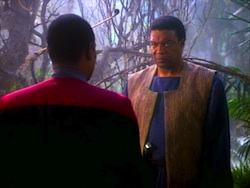
I’m nitipicking, in no particular order… first, once again Quark commits a felony, gets thrown in a holding cell and is apparently released with no real consequences because he is helpful. I have to think that selling illegal military grade hardware has to be a very serious offense, but since we like the guy and his name is in the credits, we’ll let him go with a warning.
Second, I agree with your point that we don’t really see what the issue is about. We never actually see settlers being attacked by Cardassians- the only violence against non-hostiles seems to be by the Maquis against the Cardassians actually, when they attack the Bok’Nor.
Third, why does Odo want to come and help detain the Maquis? Seriously, he just says, “Can I come?” Sisko says yes and that’s it. Odo doesn’t do anything without a reason- he’s the least impulsive character on the show at this point, and he just feels like tagging along. We miss an opportunity to get some insight about why Odo is coming.
Fourth, Sisko gives an awesome speech about how the admiralty and civilian authorities has it’s head in the sand (or perhaps somewere anatomically painful) and then it goes nowhere. He’s right back to trying to convince the maquis (and Hudson in particular) to come back to the good side and step away from their chosen path. It’s like this speech exists only for the purpose of stating “Hey, the Federation isn’t the paradise we all think it is!”
Lastly, I have always wondered if Nechayev is actually this dumb or not. Having read much of the expanded universe, Nechayev in those stories is heavily involved in Starfleet Intelligence, but for purposes of on-screen Trek, she’s just another theater commader. I can’t tell if she’s just saying the party line, or if she really believes that the colonists will just see the light of day and settle down for the good of the Federation.
Again, Keith, your thoughts come pretty close to my own. I liked the way this episode acknowledged the complications of building and maintaining “paradise.” Far from discrediting the notion of a utopian future, it makes it more plausible, by acknowledging that it was achieved through hard work and ongoing commitment rather than just being something that happened automatically.
Although I don’t think Sisko’s necessarily right when he says it’s easy to be a saint when you live in paradise. It’s a very memorable line, but I have my doubts about the premise. It seems to me that people who have fulfilled, contented lives and want for nothing often have a tendency to become self-absorbed, petty, and prone to superficial hostilities. Millions of years of evolution have conditioned us to expect threats and hardships, and so when we have no real ones, we manufacture imaginary ones, often by scapegoating people who aren’t like us and might threaten our cushy lives. Whereas you often find saintly behavior among people who live in poverty and hardship, people who understand what it’s like to suffer and have no desire to inflict it on others. People who are used to their very survival being at stake and thus don’t waste time on petty sources of conflict with other people.
I also loved the way Quark argued for peace in a distinctly Ferengi way, and it actually worked. It’s part of the way DS9 rehabilitated the Ferengi, showing that their values weren’t automatically bad. Greed, dishonesty, and sexism are bad, sure, but understanding value and how to arrange for different parties to get what they need can be an important and useful thing. And Quark was right — there was a better way to resolve the crisis, one that would benefit the parties involved far more, and be far less wasteful, than violence. Plus it’s just cool to see Quark out-logic a Vulcan. (Although it was an annoyingly contrived way to get Quark off the hook for the criminal charges by having him do something good. I don’t think the law usually works that way, unless it’s part of a formal plea-bargain. This is just one in a long series of instances where Quark gets away with blatant crimes that he really shouldn’t have gotten away with.)
And this is where the Maquis crossed the line from self-defense to simple criminality. Because they had a way to get what they wanted without violence, and they rejected it and kept on fighting. At that point, the violence was revealed as an end in itself for them rather than a means to an end. After this, I could no longer believe they were in the right. Particularly since, as you say, Hudson was so one-note here and never seemed like he had a legitimate cause. Sisko gave him too much credit.
In a way, I rather like that we never really see the Federation settlers suffering the problems the Maquis claim. It makes them a little less noble. OK, Cardassian Central Command is shipping weapons into the DMZ. But were they first, or did the Maquis start it? OTOH, I can certainly see not wanting to live under Cardassian law.
A case could be made that Central Command selling out Dukat here precipitated a lot of Cardassia’s problems down the road. He’s certainly the sort who would take away as a lesson that he needs to be very much in charge to prevent something like that happening to him ever again. The seeds of the military takeover and the alliance with the Dominion are planted right here.
I’ve liked John Shuck ever since MacMillan and Wife, but I’m not sure he has the nastiness to play a Cardassian who has risen to this level. He might be able to pull off someone from one of the civilian arms, but they hadn’t really developed the Cardassians to that point yet.
I never liked Admiral Nechayev. She always came across as interfering,
unaware, and uncaring about the actual situation. Of course, Trek has a history of this; every time a Commodore or higher came aboard Kirk’s ship it was a prelude to near disaster. Anybody in the role as it was written would come across unpleasant, but Natalija Nogulich lacks the gravitas of the office.
ETA: Another possible actor for Cal Hudson would have been Carl Lumbly. He definitely has the chops for the role and would have cost a lot less than Yaphet Koto.
@2: Did the Maquis really have a way to get what they wanted without violence though? Just because Quark says they could negotiate a deal with the Cardassians doesn’t mean the Cardassians were actually interested in negotiating. (Remember Quark also thought the Federation could have worked out a peace with the Dominion, so he seems to be a little starry eyed about how all disputes can be resolved with negotiations.) And certainly from the Cardassian standpoint it’s hard to see why they would agree to negotiate with the Maquis. The Cardassians clearly aren’t afraid of a fight, so its not like they would be afraid of the Maquis, and they believe those planets are rightfully theirs (they negotiated for them in good faith with the Federation and gave up some of their own territory to get them after all), so why would they now agree to sit down and talk with a bunch of terrorists?
@3: We don’t get to see the Federation settlers in the DMZ suffering under Cardassian rule on DS9, but we do see it first hand in the TNG episode Preemptive Strike where we see Cardassian para-military forces shoot up a Federation settlement.
I’m a pretty hardcore Trekkie, and I can’t honestly default to that oft-used axiom “I almost forgot that one existed,” because there is nothing in Star Trek I have ever come close to forgetting existed. And two-parters are especially memorable, of course, even when they’re not very good. Even so, bringing the details of these two episodes to mind is like trying to grab a bar of soap with wet hands. I know they’re there, I know they’re kinda important to the various storylines, and yet… and yet and yet and yet. They’re very slippery, and not in a good way. I think the 5/10 score for both parts is about right.
@@.-@: But that’s just it — what made the Maquis terrorists is that they didn’t even try to take the peaceful option. We’ll never know if negotiation would’ve worked, because they kicked that option off the table.
The key to Quark’s argument is that the colonists had leverage over the Central Command, due to the proof that they’d armed the Cardassian colonies in violation of the treaty. It wasn’t just dependent on the Cardassians’ good faith. The colonists had the upper hand at that point, but the Maquis squandered that advantage by continuing the violence. They just weren’t thinking strategically. They wanted to fight as an end in itself and so they weren’t looking for other options, even when those options would’ve served their interests better.
Besides, whether the planets are rightfully the Cardassians’ isn’t in dispute. The settlers in the DMZ chose to live under Cardassian rule rather than give up their homes. All they wanted was to be protected under Cardassian law, as the Cardassian citizens they were supposed to become. So they didn’t pose a threat to Cardassian territorial claims; they voluntarily accepted those claims. The only reason they were being attacked was racism.
Why no love for Bernie Casey? He isn’t Avery Brooks, but then no one else is either! His character whould of been better if DS9 had used him in earlier shows.
ra_bailey: because Bernie Casey is a terrible actor. Honestly, I’ve never liked him in anything I’ve seen him in, he’s wooden and limited and just terrible.
—Keith R.A. DeCandido
Krad, the points you and CLB make are spot-on. You want to want to sympathize with the Maquis, but they make it impossible. Cal Hudson just disregards any position other than his own, despite Sisko’s every attempt to protect him and get him to stand down and negotiate. The Maquis quickly went from self-defense to killing because they were angry at the Cardassians and the Federation.
And frankly, choosing to stay under the Cardassians, knowing they are truly awful, makes no sense. I would have to give up my home and relocate rather than risk my or my family’s safety for sentimental reasons. And then when the Cardassians demonstrate how awful they are I take up arms and risk my life, my family’s life, and a new Federation war with Cardassia all because I don’t want to give up my land and move somewhere else, in the vastness of Federation space, that would be safe? I’m sorry, their position makes no sense.
I’ve been rewatching these episodes in mini-marathons of several at a time. In this case, I started with “Paradise” and ended with “The Maquis Part II.” From that perspective, these two bookended each other nicely. In “Paradise,” Sisko is put in the role of rebelling against the system, but unlike the Maquis, he does so non-violently when he climbs back into that box. (And can I get a belated “DANG!” for him climbing back into that box?) Then, in “Maquis Part II,” he makes his famous Earth-is-paradise speech, and I can’t help but wonder if the events of “Paradise” were in the back of his mind.
Are we absolutely sure that Sakonna wasn’t really attracted to Quark, at least a little? I know it’s hard to tell with Vulcans, but I could have sworn there was a little something spicy there in the occasional look she gave him.
@6: What leverage did that information actually give the Maquis over the Cardassians though? The only power that actually has the means to enforce the treaty with the Cardassians is the Federation, and Federation policy during this time period was pretty much blatant appeasement of the Cardassians. Lets look at some of the recent history between the two powers:
The Wounded: Captain Picard turns a blind eye to the Cardassians secretly rearming in order to maintain the peace between the two nations.
Ensign Ro: The Cardassians outright destroy a Federation colony, a clear act of war. The Federation does nothing in response.
Chain of Command: The Cardassians get caught red handed preparing to seize a Federation colony that the Cardassians explictly gave up as part of the armistice agreement. This is another clear act of war, and again the Federation does nothing but restore the status quo at the start of the episode (despite having the Cardassian fleet at their mercy.)
The Circle trilogy: The Cardassians get caught basically planning to reinvade Bajor. Yet another blatant act of war and again the Federation does nothing in response.
Four major incidents in the last three years of the Cardassians acting in an aggressive manner and violating the accords they reached with the Federation and Bajor and in no instance did the Federation do anything signficant in response. Given that history plus the fact that the Cardassians have already broken their previous agreement with the colonists why would any colonist in the DMZ trust the Cardassians to honor any further agreements they make or trust the Federation to hold the Cardassians to the agreement? And if you can’t trust or force the other party to stick to any agreements they make then diplomacy isn’t a viable option.
@11: Pre-emptively saying that diplomacy can’t work, that nonviolent options shouldn’t even be tried and you should just default to killing, is utterly reprehensible. Force should be the last resort after all else has failed — not something you actively look for excuses to indulge in.
@9: “I’m sorry, their position makes no sense.”
It is realistic, isn’t it?
@12: What is the point in attempting diplomacy when you know the other side won’t honor any agreement they make? The Cardassian Central Command has literally violated every agreement they have ever made with the Federation. Diplomacy can’t work when the other party won’t negotiate in good faith, and it is just foolish to keep trusting a government that keeps breaking its word. Nor is there any reason to believe non-violent resistance would have worked. The Bajorans tried non-violent resistance at first when the Cardassians occupied their planet, and it was utterly ineffective. The colonists would be aware of that history, so they would know non-violent resistance was not a viable option in this case. As such their options really were only abandon their homes (which they were unwilling to do) or fight.
@14: Again: It’s easy to make excuses for violence by assuming that other options aren’t even worth trying. People do it all the time, and that’s why so much unnecessary suffering happens.
Yes, the Cardassians couldn’t be trusted and needed to be kept in check, but that doesn’t mean a lot of random killing is a good way to do that. There are ways to put pressure on recalcitrant governments without going to war against them — as we’ve recently seen with Syria. But if you assume that killing is the only option, then that’s just a self-fulfilling prophecy, an excuse for violence, and it makes you no better than the other guy. Just because the problem of the Cardassians’ deceit is genuine, that does not mean that violence is the only possible response to it. That’s the mentality of someone who wants to engage in violence and is just looking for an excuse. Or someone who’s just too lazy or stupid to think of other alternatives. As Malcolm McDowell’s H.G. Wells said in Time After Time, “The first man to raise a fist is the man who’s run out of ideas.”
Interesting things to think about.
I wish I had more wisdom to offer here, but I don’t. I’m not sure exactly what I would do in this situation – in all honesty, I’d probably leave – I’d value my own safety and my family’s safety over an attachment to a particular place. Even though, in principal, I should have a right to live there peacefully.
I also greatly enjoyed Quark’s speech – it’s nice (and more interesting) to see a way that the things Ferengi value and the way their outlook on the world works result in something other than hijinks and villainy.
Also, CLB at 2 – your comments about what makes a saint are kind of scarily right on in my opinion :) I know what Sisko is getting at – there are certain things it’s easy not to be tempted to when you’re not desparately trying to look out for your own surivival and living under crushing poverty – but there is definitely a sweet spot of, for lack of a better term, suffering/hardship, that I think can be good for a person. (Please do not take that as an endorsement for spreading, causing or preventing the relief of suffering!)
@13, from a civilian standpoint, its not realisitic at all. You’re not a Starfleet officer, no combat training, you’re just a work-a-day civilian, maybe you have a family, maybe not. Even if you’ve had your home and land for years, as unfair as it is, safety would have to be first over principle.
@14, the Maquis would have been far more sympathetic had they tried–tried–a diplomatic solution before resorting to terrorism. But they didn’t even try, and immediately took to violent retaliation.
I actually really like Part 2. Part 1 is meh, but I guess you have to set up the story somehow.
As for not seeing what’s happening to the Maquis…I’m not bothered by that at all. This story’s told from DS9’s point of view. The main characters don’t see what’s happening to the Maquis either. All we know is what they know, and that’s perfectly fine.
Nor am I not bothered that the Maquis don’t “make sense.” Why don’t they just pack up and leave? I dunno, why don’t the Palestinians just pack up and leave?
@15 I don’t agree with all your points about the Maquis or diplomacy in general, but that’s an excellent quote. It would be great if more people followed that principle.
@17, 18 What about Israeli settlers? They often haven’t the backing of the government, so they’re taking it from both sides like the Maquis, yet still stayed and put their families in danger, and in most cases haven’t even had their land that long. I wouldn’t do it either, but I’m sure there are numerous exasmples.
@15: The problem is waiting too long to take up arms can also lead to much unnecessary suffering. That’s the lesson of the TOS episode City on the Edge of Forever, where Edith Keeler living leads to the US staying out of World War 2 just long enough to insure a Nazi victory. We’ll also see it later on in DS9, when even after the Dominion has occupied Cardassia and tried to nova bomb Bajor (which would have killed billions of innocents), the Federation still held off on going to war. The Feds had the Romulans willing to fight alongside them at that point, while the Cardassians were still weak from the Klingon invasion and only a single Dominion task force was in the Alpha Quadrant. But instead of attacking the Federation continued to try diplomatic approaches and what happened? They lost the Romulans as allies, the Dominion rebuilt the Cardassian economy and military (making them much more dangerous) and greatly increased the size of its own forces in Cardassian space and a few months later the Feds found themselves at war anyway but in a much worse position then if they had acted earlier. There is a point where further diplomacy is futile and fighting is the only option.
As for Syria, that may still turn out to be a Cardassian peace treaty where Assad violates it at will. But even if Assad does actually honor the deal, he was only willing to negotiate when the threat of force was raised against him. The Cardassians aren’t facing a credible threat of force from the Federation though because they know that the Feds want peace at almost any cost. (As witnessed by the Feds literally letting the Cardassians get away with murder.)
@17: Well the settlers did already reach an agreement with the Cardassian government (made in the TNG episode Journey’s End) which the Cardassians promptly violated.
I don’t really have anything to contribute to this discussion; KRAD hit my approximate position on the head with his review of the ep.
I just want to chime in to say: Keith, you are my hero for using “free rein” correctly. You never see anything but “free reign” anymore and that makes me a sad panda.
I’ve always wondered, why was the name Maquis chosen for the Maquis? I think I read somewhere that the Maquis was a French resistance group in WWII, but were they a particularly violent resistance group?
@14, even taking it as a given that the Cardassians are untrustworthy negotiating partners, the Maquis could have taken their evidence to the Federation with the idea that the Federation would hassle the Cardassians for breach of treaty. You do raise valid points about the UFP generally being weak-willed when it comes to this sort of thing, but if this episode had at least included a few lines to the effect of, “We sent this info to the Federation Council, but they said it’s not in their jurisdiction anymore,” I’d be a little more convinced that the Maquis had exhausted all options other than violence.
-Andy
This has turned into a rather interesting debate. On one hand, bguy has a good point: you can’t negotiate until you have some reason to believe that the other side intends to honor the agreement. Thus far, the Cardassians have a very poor record of honoring their treaties, and the Federation has just as bad a record of trying to hold them to account. Given the list bguy gives @11, I can see Hudson thinking negotiations are a joke. On the other hand, though, I don’t think the earlier incidents ever get brought up. If Hudson were to say that he’d like a peaceful solution but then runs through the list and says that he can’t negotiate with people who don’t honor their agreements, the Maquis would be more sympathetic. As it is, he comes off as more wanting revenge than wanting negotiations but not being able to trust them.
@22,
If you define “violent” as “blows stuff up and kills Nazis,” then yes, the Maquis were quite violent. They did some non-violent activities as well, such as helping smuggle Jews and downed Allied pilots to saftey, but this was not a group that organized sit-ins and protest marches. They were an army.
@22: You need to think of it in terms of the characters’ motivations, since the writers’ motivation would be to figure out what the characters would plausibly choose to do, and the freedom-fighters would not have given themselves a name that made them look bad. The members of the Maquis presumably chose that name for themselves because the historical Maquis represented a noble cause, a heroic resistance against an indisputably evil foe. It’s a propagandistic choice, equating the Cardassians with Nazis and themselves with an occupied nation legitimately fighting for its freedom. The writers weren’t endorsing that view, but it reflects how the characters themselves wanted to be seen.
And, probably, the writers chose it because it sounded cool and distinctive.
Do we know that the people in the DMZ didn’t petition the Federation? I got the sense that they did and were soundly ignored because they weren’t Federation citizens any more. Not sure why I thought that, though.
@26, It would make sense, but we don’t know for sure. If it didn’t happen on screen (or told to us), it didn’t happen. It can’t be used to help explain their motivations in this episode, and represents a weakness in writing.
If you’re asking about information from a previous episode or some throwaway line in this episode, I don’t recall.
I found it amusing that they had all these carried-over colloquialisms from days gone by, i.e., “The treaty is just a piece of paper,” and “You’ll end up behind bars.” Obviously, they should say things like “The treaty is just computer data,” and “You’ll end up behind a force field.” But using common phrases even though they are out of date happens in real life, so I found this very amusing. I doubt the writers were trying to introduce that subtlety into the universe; they probably just threw common phrases in there without thinking about it. I still found it very amusing though.
I was going to say that it was neat to have a part II of a two-parter not be a total let down, as we’ve seen a lot on TNG. But I don’t know how well-received that will be, since most of you seem to feel “meh” about both parts. I enjoyed both parts though, and felt that part II escaped the “Part II Syndrome.” But maybe that’s because they didn’t span a season-to-season or mid-season hiatus. They were back-to-back, given the airdates listed. So maybe it was just written as one story instead of having to set up this really catching cliff-hanger and then trying to figure out months later how to get out of this impossible situation they’d created.
Also, I’m another one who thinks Quark should not have gotten off for this.
I agree with many of the above criticisms, the story could have been improved a number of ways. But I’m watching DS9 for the first time, and really enjoyed this one. It pushes forward in a few directions that really make the Trek universe richer, and have really surprised me.
Quark’s appeal to the Vulcan’s logic through the vehicle of the means of acquisition was a really great example of two (albeit caricatured) races meeting in the ideological middle.
In fact, Quark here, along with Profit and Loss, has started to really pull away from the two-dimensional Ferengi stereotype. (The Nagus episodes have been an opportunity for this, but usually they just reinforce the profit focus… its his lovelife that adds another layer.) I enjoyed Sakonna’s acting, I think she really threaded the line when she said she found Quark “intriguing,” a faint half-smile that leaves her level of affection ambiguous (even moreso for a Vulcan).
The Maquis aren’t reasonable, but terrorists rarely are, and they highlight a Federation dilemma that’s clearly not susceptible to a pat solution at the end of an hour. They also add a depth to the universe that seems to pay a lot of dividends in future stories.
Eh, yeah, it could have used a rewrite, some better acting, but it definitely goes on my abridged list of episodes, required viewing for any of my friends that rewatch in my wake.
> I enjoyed Sakonna’s acting
I mean, Bertila Damas’s acting, of course. :)
Can’t wait to see her back in Voyager, really wish her Vulcan here stuck around a while. It was nice to see a Vulcan actually learn something for a change, from a Ferengi no less!
Hi Thomas B! I don’t have much to say specifically in response to your comments, but it’s nice to see another first time watcher :) As an FYI, if you are concerned about such things, spoilers are allowed in the thread, given the show’s age. It hasn’t hampered my enjoyment of the series though (although some of it I was already spoiled for anyway).
@22: I’ll direct you to the Voyager two-parter “The Killing Game” as a response to your question. ;)
I believe it parallels the historical Maquis with the fictional group quite adequately… I find the usage of 1940s occupied France as an allegory for both the crew’s immediate predicament and some of said crew’s previous affiliations (and their self-perceptions thereof) to be rather poignant, which until now I hadn’t even realized actually worked on multiple levels.
“Peace treaty” is Cardassian for “time to rearm”.
@28 – crzydroid: I liked this two-parter, too.
I liked the scene where Quark convinces Sakonna. The writers do a terrific job again of showing us that the Ferengi society, based on nothing but greed and “rules of acquisition” might actually work, as you can interpret many of the rules in different ways.
Other than that I doubt I will remember much of this two parter when the Maquis are mentioned again. Too much stuff going on.
The review is pretty bang on in pointing out the fallacy of the Maquis and their totally unreasonable refusal to consider any other course but violence. One thing that is also completely silly is Cal Hudson even suggesting Sisko let the Maquis use DS9 as a maintenance facility; seriously!?
I love the character development of Gul Dukat and Quark in this episode. It was ultimately inevitable that Dukat would return to his villainous ways, but having him as a more sympathetic character for a while was awesome. I especially loved the establishment that Cardassians are highly resistant to mind melds because of their mental discipline. Considering how they had been depicted previously as a suspicious and secretive race, it make a lot of sense.
As for Quark, or I guess the Ferengi as a whole, we finally see them become more than just caricatures in this episode, which is great.
I really have to disagree with you here, KRAD, I thought this was a pretty good episode; not one of DS9’s best, admittedly, but a solid outing that gives us a taste of what the series would become once it fully hit its stride. Key to this is the morally ambiguous nature of the conflict our heroes find themselves embroiled in. Simply labeling the Maquis as unreasonable terrorists out of hand is, quite frankly, a very simplistic take on matters, and ignores what gives both this episode and the Maquis story arc overall its power.
Specifically, this is a moral dilemma Sisko and company are forced to navigate, and like all great moral dilemmas in fiction, both sides have a point. The Federation is correct: the Maquis are violent troublemakers whose actions threaten to reignite a conflict that will see numerous innocent deaths and that Starfleet is unprepared to fight. At the same point, however, the Maquis are also correct: the Federation has cravenly abrogated its responsibilities towards its own people and left them to fend for themselves, all in the hopes of maintaining a peace with a hostile power that, as bguy so effectively illustrated, has never signed an agreement it wasn’t willing to use as toilet paper. Finding a peaceful resolution to a problem is all well and good, but if you can’t trust the other guy to hold up their end of the agreement, then it’s an exercise in futility.
(Also, on a semi-related note, I find it kind of ironic that on a site constantly plugging books centered around “decolonializing thought” and the evils of imperialism and so on, so many commentators on this thread are wagging their fingers at those nasty-wasty Maquis for refusing to give the racist, colonialist, imperialist military junta the benefit of the doubt. Just an observation).
And all of this provides a very tricky and dramatically-rich crisis for Sisko and company to navigate, one that leaves him in the unenviable position of having to enforce a political decision he doesn’t agree with, and take up arms against an old friend while Space Hitler rides shotgun. I’m actually pleasantly reminded of Bernard Cornwell’s Saxon Stories, oddly enough; a lot of the drama in that series revolves around Uhtred having to fight the culture he loves on behalf of the culture he hates, and there’s echoes of that here. The final verbal clash between Sisko and Dukat also serves as an effective reminder that as charming and charismatic as the latter can be, he still possesses a radically different worldview and interests than our heroes, and neither he nor the system he serves are good despite being temporary allies against the Maquis.
I also don’t particularly mind that we don’t get a clearer look at life in Cardassian-controlled space. While you’re right that it would offer a stronger sense of motivation for the Maquis, what we get is decent enough, and all the previous episodes spent focusing on the Occupation of Bajor and its aftereffects gives us a solid picture of how the Cardassians operate and why people would be tempted to take up arms against them.
Overall, this is just a very solid episode that gives the audience a lot to chew on, and doesn’t offer any easy outs or answers. That the Maquis don’t live up to the noble aspirations of the Federation and how humans are “supposed” to act is kind of the point, and the questions around where, how and should such ideals give way to the practical realities of life in the DMZ are well-worth considering.
Lockdown rewatch. Not much different to my comments on part one, I like this much better than the general consensus, the Dukat scene in the Runabout is one of the highlights of the season, both Sisko and Kira’s faces are a picture. I do get the feeling the writers and staff hadn’t decided which way the Dukat character was going to go at this point villain, hero, anti-hero… I think it was only decided on what would eventually be the direction after what happened to his daughter, that finally deranged him.
@37/chadefallstar: I believe that was the case with Dukat. While ‘The Sacrifice of Angels’ is when he went “binky bonkers” (to quote Krad in several rewatch reviews ), I think he was pretty much irredeemable after his betrayal in “By Inferno’s Light” the previous season.
), I think he was pretty much irredeemable after his betrayal in “By Inferno’s Light” the previous season.
I remember reading somewhere that Marc Alaimo was less than enthusiastic about Dukat’s heel turn. He much preferred his character being ambiguous because that was far more interesting a character to play. Also, it was his character and he felt he knew Dukat’s ins and outs better than anyone before the showrunners did a 180 on him.
However, I do think it was neccessary to have him as the big baddie in the later seasons. But I can’t deny he had some marvelous scenes earlier in DS9‘s run, including this episode’s scenes. My favorite scene here was when he was being interrogated. His smug contempt at the Maquis’ novice interrogation methods was awesome! I especially loved how it was revealed that through training, Cardassians could block Vulcan mind melds and presumably other forms of telepathy.
The best use of Mr. Casey’s dead pan talents was the following line from Bill and Ted’s Excellent Adventure. “It seems to me the only thing you’ve learned is that Caesar is a “salad dressing dude.”
33: Captain Maxwell believed that too.
Just rewatched this two-parter and the thing that bothered me most is that Dukat was able to deck Sakonna twice. Cardassian strength appears to be on par with human, while full blooded Vulcans are three times stronger than humans of the same physical age, height and build. Even assuming that Vulcans have the same sexual dimorphism as humans, a man Dukat’s size wouldn’t be stronger than three women Sakonna’s size. Certainly not enough to drop her with one shot.
@41 But it’s very Dukat to go after the woman, though.
Keith, above: “The episode is also a superb showcase for Avery Brooks and Marc Alaimo”
Yep.
Keith, on Part 1: “the old-friend conversations between Sisko and Hudson … are the only times that the wooden and generally awful Bernie Casey is in any way watchable”
Yep.